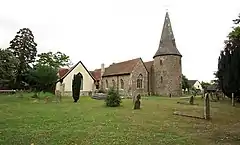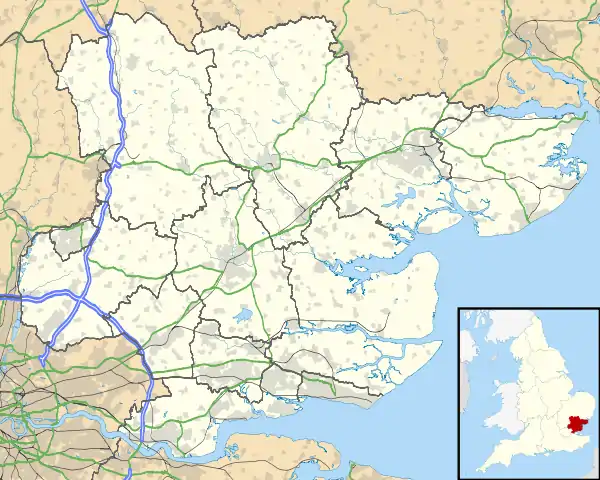Broomfield, Essex
Broomfield is a village and residential suburb in the City of Chelmsford district, immediately north of the city itself. It is the site of a major Accident & Emergency hospital. There are two public houses as well as primary and secondary schools [2] and sports clubs.
| Broomfield | |
|---|---|
 St Mary, Broomfield | |
 Broomfield Location within Essex | |
| Population | 3,971 (2008)[1] |
| OS grid reference | TL706103 |
| District | |
| Shire county | |
| Region | |
| Country | England |
| Sovereign state | United Kingdom |
| Post town | Chelmsford |
| Postcode district | CM1 |
| Dialling code | 01245 |
| Police | Essex |
| Fire | Essex |
| Ambulance | East of England |
| UK Parliament | |
The village was struck by an F1/T2 tornado on 23 November 1981, as part of the record-breaking nationwide tornado outbreak on that day.[3]
Local amenities
Broomfield Hospital is one of the largest in the East of England. It is a national specialist centre for Plastics and Burns treatment. It also is a specialist clinic for the diagnosis and treatment of complex ENT cases.[4]
There are two sports clubs - Broomfield F.C. and Broomfield Cricket Club.[5] Broomfield Football Club was established in 1905.[6] The club still plays on its ground in Mill Lane, Broomfield
The charity Green Zone Community Climate Action begun in the village.
Schools
Broomfield Primary School is a primary school located on School Lane, next to the Scouts hut.
Chelmer Valley High School[7] is a secondary school situated next to the hospital.
Transport
Several First Essex bus routes run between Broomfield and Chelmsford city centre.
Religious sites
The local church is St Mary with St Leonard, on Church Green. It has a round tower which is unusual for an Essex church. It is part of Chelmsford North Deanery.[8] There is also a Methodist church, at 124 Main Road.
Saxon princely tomb
Broomfield is the site of an important Anglo-Saxon burial which was discovered by workmen in 1888 after which there was a partial excavation. A more complete excavation was later made by CH Reid. Finds include weapons, gold ornaments and domestic items such as glassware, cups and buckets. The finds are now in the British Museum.[9] The burial has been compared with Taplow and Sutton Hoo.[10]
References
- Broomfield Parish Population Statistics - February 2008 Archived June 15, 2011, at the Wayback Machine
- Broomfield School website
- http://www.eswd.eu/cgi-bin/eswd.cgi
- Broomfield Hospital Archived November 5, 2006, at the Wayback Machine
- Broomfield Cricket Club Archived February 8, 2011, at the Wayback Machine
- "Essex Olympian Football League". Archived from the original on 18 October 2007. Retrieved 12 November 2008.
- Chelmer Valley High School website
- Anglican Directory for Chelmsford
- British Museum Collection
- WT Jones, Early Saxon Cemeteries in Essex